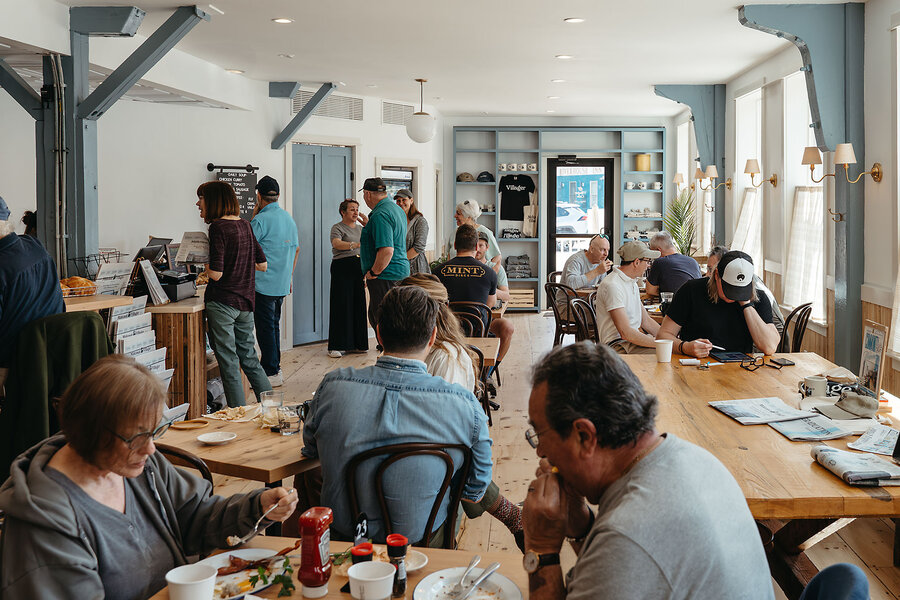Now Reading: ‘Fresh brewed news’: Community café offers locals a chance to sip with reporters
-
01
‘Fresh brewed news’: Community café offers locals a chance to sip with reporters
‘Fresh brewed news’: Community café offers locals a chance to sip with reporters

It’s a sunny morning in downtown Camden, Maine.
Inside the Villager Cafe, the scent of freshly brewed coffee lingers, and chatter is sporadically interrupted by chirps from a cafégoer’s walkie-talkie. Three women settle into a window-side table. They’ve known each other since high school, and they regularly meet to discuss politics.
It’s an apt place to do so. Print copies of the Midcoast Villager — an online daily and weekly print newspaper covering midcoast Maine — are displayed near the cash register. Merchandise bearing the paper’s mascot lines nearby shelves. Just upstairs, a small, bustling newsroom is rushing to meet the weekly print deadline.
Why We Wrote This
A story focused on
It’s no surprise that news outlets are struggling for both dollars and trust. In Camden, Maine, a local newspaper opened a café to welcome in the community.
The Villager Cafe, which opened in April, isn’t just a café. It’s a newsstand and events space for the Midcoast Villager. The newspaper wants the café to be a “third space for community engagement,” in the words of deputy editor Alex Seitz-Wald.
Today, both cratering trust in the media and declining readership have led some to wonder whether the United States is in a “post-news era.” Last year, 130 newspapers shut down at a rate of almost 2 1/2 per week, according to a report from Northwestern University’s Local News Initiative. As of last October, 206 counties across the U.S. don’t have a local news outlet at all.
Local media outlets, facing steep financial losses, are finding new ways to reengage with their audiences. Some, such as WBUR, an NPR affiliate in Boston, have opted for performance and event spaces; others, such as The Texas Tribune, host festivals.
The loss of local newspapers is “really damaging to civic life and civil discourse, and the ability of average people to be informed about their community,” says Meg Heckman, an associate professor of journalism at Northeastern University in Boston.
“It’s a lot harder to know what’s going on in town hall, [or] what changes to federal environmental policy might mean to rural farmers or fisheries or tourism,” she adds.
“You either grow or die”
Reade Brower has long been regarded as Maine’s “media mogul.” In 2019, he owned six of Maine’s seven daily newspapers, more than 20 weekly publications, and three printing presses. In 2023, he sold the vast majority to the National Trust for Local News, a nonprofit. Four of the papers he held onto — the Camden Herald, the Republican Journal, The Courier-Gazette, and The Free Press, as well as an online news platform known as Village Soup — became the Midcoast Villager. It published its first issue in late 2024.

Hannah Hoggatt/Courtesy of the Midcoast Villager
Copies of the Midcoast Villager, a newspaper covering midcoast Maine, are displayed at the Villager Cafe in Camden, May 27. The first issue was published fall 2024.
Locals were unsurprised that the newspapers were struggling – and there was little pushback to consolidating the publications into one newspaper.
“Now, it’s so common to understand that media is not working as a business,” says Kathleen Fleury Capetta, co-founder of the Midcoast Villager. “The foundation was set for us.”
With the advent of online platforms like Google, Facebook, and Craigslist, advertising revenue that long funded news publications has all but disappeared. U.S. newspapers earned $49 billion in advertising revenue in 2006; that number dropped to less than $10 billion in 2022.
Around 85% of U.S. adults believe that local news outlets “are at least somewhat important to the well-being of their local community,” according to a 2024 Pew Research Center survey. But only 15% say they’ve paid or given money to any local news source in the past year, which has largely remained unchanged since 2018.
People have been curious to check out the café, says Aaron Britt, co-publisher, peppering him with questions like: “‘Is it open? Can I come in? What’s going on? I want to see it,’” says Mr. Britt. “And I’ve just heard like nothing but great things. People like the food, people run into everybody that they know.”
The idea, he adds, is “Community members can feel like, ‘Oh, this is my spot.’”
Mr. Brower had long dreamed of putting cafés into every community in which he owned a paper. Ms. Capetta had previously been asked to plan and open a news café in the Cayman Islands – though the concept fell apart due to the pandemic. Together, they came up with the Villager Cafe.
“I believe very strongly in the statement that you either grow or die,” says Mr. Brower.

Mackenzie Farkus/The Christian Science Monitor
Midcoast Villager co-founder Kathleen Fleury Capetta (left), publisher Aaron Britt (center), and deputy editor Alex Seitz-Wald, sit in the Villager Cafe, May 28.
Shifting perspectives
Alongside the decline of local newspapers, the media industry is facing a lack of trust.
For the past three years, “more U.S. adults have no trust at all in the media (36%) than trust it a great deal or fair amount,” according to a 2024 Gallup poll. However, Americans have a more positive outlook of their local news according to 2024 polling by Pew, with 78% of Democrats and 66% of Republicans stating that local news media report news accurately.
“I think a lot of where we are today is due to the perception that there are editors and writers away in this tower who are covering issues, but they’re not fully connected with readers,” Ms. Capetta says. “We’re trying to shift that perspective.”
Each Friday, a rotating Midcoast Villager editor hosts “Fresh Brewed News,” where members of the public can discuss local issues and gain insight into how the week’s stories came to be.
There’s a Silent Reading Club, where people can commune with fellow readers for an hour of silent reading, bookended by a few minutes of conversation. In the future, Mr. Seitz-Wald hopes to hold debates on local issues.
“The café’s goal at the very start has been, ‘How do we connect our community and create a respectful place of dialogue?’” says Mr. Brower. “We believe we’re achieving that.”
Though the café model may be a step in the right direction toward fostering trust, Professor Heckman cautions against this model as a “silver bullet” for the struggling news industry.
“I don’t think brewing coffee every morning is necessarily going to solve all of the audience trust issues out there,” she says. “I do think for a local audience, the ability to attach a physical location and names to faces, to personalities, to people who are in their community, they shift the dynamic a little bit.”
Staffers at the Midcoast Villager have already fielded calls from other media organizations interested in the approach.
“Anybody is welcome to call us up and steal our idea if they like it,” Mr. Brower says.























